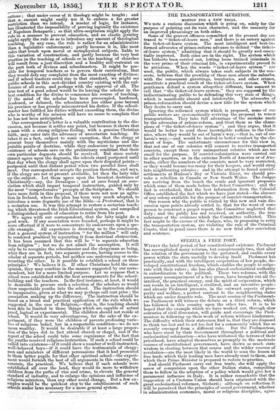THE TRANSPORTATION QUESTION.
MOTION FOR A NEW TRIAL.
WE note a curious discussion which is going on, solely for the purpose of pointing out its vain character, and the necessity for an improved phraseology on both sides.
Some of the gravest offences committed at the present day are traced to " ticket-of-leave men," and there is an outcry against the ticket-of-leave system. The most intelligent and best-in- formed advocates of prison-reform advance to defend " the tickct- of-leave system," admitting that it should be greatly and essen- tially improved. Both sides are in the right. The system which has hitherto been carried out, letting loose trained criminals in the very prime of their criminal life, is experimentally proved to be atrocious. When the words "ticket-of-leave system" arc used, the public, which always takes such subjects in the con- crete, believes that the prowling of these men about the suburbs, with the consequent garottings, burglaries, and other crimes, constitute a practical result of the ticket-of-leave system. When gentlemen defend a system altogether different, but consent to call that "the ticket-of-leave system," they are supposed by the indiscriminating public to be defending this very state of things, which is manifestly absurd and intolerable. The advocates oi prison-reformation should devise a new title for the system which they desire to carry out.
Ignoring the reformed system which is proposed, some of our public writers are systematically reviving the proposal to renew transportation. They take full advantage of the mistake made by the advocates of prison-reform, and treat them as the cham- pions of "the ticket-of-leave-system"; sysiem " ; and they argue, that it would be better to send these incorrigible ruffians to the Colo- nies, where they would be out of harm's way,—that is, out of our harm's way,—and would be incited to better conduct by the ele- ment of hope. The unfortunate circumstance for this view is, that not one of our colonies will consent to receive transported convicts, except those very unimportant colonies which are too small for the purpose. If convict-colonization were carried out in other quarters, as in the extreme North of America or of Aus- tralia, either the numbers of the convicts must be very restricted, or they would become too many for their keepers, and would stray into neighbouring colonies; and in the attempt to found eonvict- settlements at Hudson's Bay or Victoria River, we should pro- voke a rebellion in Canada or New South Wales. The Judges are reviving from the bench the crude and ignorant proposals which some of them made before the Select Committee ; and the fact is overlooked, that the best information from the Colonial Office established the fact which we have just stated—the absence of any colony available for the purpose of convict-transportation. One reason why the public is visited by this new and vain dis- cussion upon points already settled is, that for the want of some person to construct a proper report, the Committee neglected that duty ; and the public has not received, on authority, the true substance of the evidence which the Committee collected. This fact might be the excuse of the Judges, who, in proposing to retry the transportation system, are violating the rule of the Criminal Courts, that in penal cases there is no new trial after conviction and sentence,


























 Previous page
Previous page